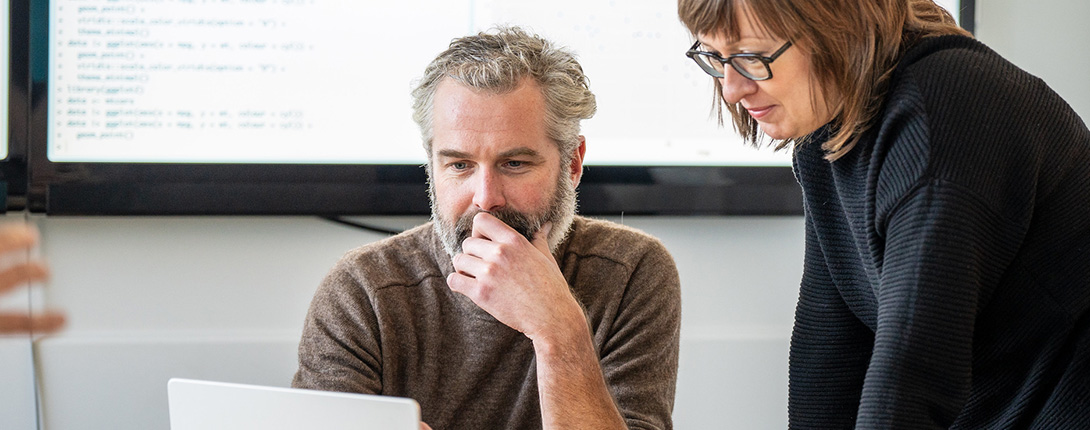
Advance your career with UBC’s Master of Management—a graduate-level business program designed to sharpen your strategic thinking, leadership capabilities, and decision-making skills. This program empowers professionals to navigate complexity, lead with confidence, and deliver results across industries.
The Master of Management is a forward-looking program that blends academic rigor with practical application. You’ll engage with bold ideas and innovative approaches in a collaborative learning environment, gaining the tools to lead effectively in today’s fast-paced, global business landscape.
Whether you’re looking to pivot into management or elevate your current role, the Master of Management provides the foundation and momentum to move your career forward.
The program offers two flexible delivery options: a full-time, 12-month format for accelerated career advancement, or a part-time, 25-month format that allows you to balance work and study. Both formats connect you with a global network of peers and practitioners, and challenge you to address emerging business issues with clarity and purpose.
| Program | Components | Expected Duration |
| MM | The full-time program is delivered over 12 months of full-time study and includes a four-month internship, providing immersive academic and real-world business experience. | 12 months |
| MM | The part-time program is delivered primarily online over 25 months, with three in-person sessions strategically scheduled throughout the duration to enhance collaboration and applied learning. | 25 months |
This course-based master’s program is built for impact. Whether you’re advancing in your current role or preparing for a strategic career shift, you’ll gain actionable insights and immediately apply new knowledge to real-world business challenges. The curriculum emphasizes innovation, strategic thinking, and leadership development—empowering you to influence your organization from day one.
Through your Applied Project, you’ll investigate a business issue of your choosing, supported by expert academic guidance. This hands-on inquiry allows you to experiment with original approaches and deliver strategic solutions tailored to your professional context.
As part of a globally connected cohort, you’ll engage with an international network of peers and scholars, exchanging ideas and perspectives that prepare you to lead across borders and industries.
Graduates of the Master of Management program are equipped to step into a wide range of leadership and strategic roles across industries. With a strong foundation in business principles, combined with hands-on experience and critical thinking skills, they are prepared to lead teams, drive innovation, and contribute meaningfully to organizational success.
Career outcomes include roles such as Strategic Initiatives Manager, Project Lead, Operations Strategy Manager, Brand Strategy Manager, Business Strategy Analyst, Digital Innovation Consultant, and Corporate Financial Analyst.
This program welcomes applicants from all academic backgrounds. While a business undergraduate degree can provide a helpful foundation, it is not required—what matters most is your ambition, curiosity, and readiness to grow.
UBC’s Master of Management program develops business-ready professionals who bring strategic insight, analytical thinking, and leadership potential to your organization. Globally recognized for excellence in teaching and research, UBC prepares graduates to thrive in today’s fast-paced and competitive business environment.
As an employer, supporting an employee through this program means investing in your organization’s future. Graduates are equipped to address complex business challenges, lead cross-functional initiatives, and contribute to innovation and growth from day one.
The program offers two flexible delivery options to suit your organization’s needs: a full-time, 12-month format for accelerated development, and a part-time, 25-month format that allows employees to continue working while advancing their business expertise. Both formats ensure minimal disruption to operations while maximizing the return on your investment.
Participants also gain access to a global network of business thinkers and innovators—connections that extend beyond graduation and can spark new opportunities for collaboration and strategic insight.

UBC’s Master of Management program offers two flexible formats: a full-time, 12-month option with a four-month internship, and a part-time, 25-month option delivered primarily online with three in-person intensives. Both are designed to support career advancement while accommodating professional commitments.
We welcome applicants from a range of academic and professional backgrounds. Admission criteria can be found here in the Academic Calendar, and those with alternative qualifications are encouraged to contact the Academic Programs Office for personalized advising.
Financial support is available on a competitive basis for qualified candidates.
| Tuition | Tuition fees are typically collected in instalments; for more information please visit the Academic Calendar. More information on tuition payment options can be found on the Awards and Financial Support website. |
| Payment Options | We understand that financing your education is a significant decision. In addition to traditional funding sources, students may consider private lending options and other alternative payment plans to help manage tuition and program costs. These options can offer greater flexibility and personalized terms to suit your financial needs.
|
| Mandatory Student Fees – please see the Okanagan Academic Calendar | Visit the UBC Students’ Union Okanagan website for more information. UPASS fees are usually included in student fees levied each September; however, MM students are exempted. |
Travel, accommodation and subsistence costs vary substantially according to your point of origin and personal preferences. Students are expected to make their own arrangements to attend in-person required learning.
If you would like to find out more about the Master of Management program, including our 2026 intakes, please contact our Academic Programs Office by email at fom.mm@ubc.ca, or call 1-877-807-9644 or 250-807-9644.
Applicants from a university outside Canada at which English is not the primary language of instruction must present evidence of competency to pursue studies in the English language prior to being extended an offer of admission. Tests must have been taken within the last 24 months. Acceptable English language proficiency tests for applicants to graduate studies are outlined here.
When you are ready to apply, or need to check the status of your application, access the online application system.
CONTACT OUR MASTER OF MANAGEMENT PROGRAM OFFICE:
Email: fom.mm@ubc.ca
Toll Free (Canada and USA): 1-877-807-9644
Tel: 250-807-9644
MAILING ADDRESS
Master of Management Program
The University of British Columbia – Okanagan Campus
EME 4145 – 1137 Alumni Ave
Kelowna, BC, V1V 1V7
Canada

The University of British Columbia is a global centre for research and teaching, consistently ranked among the 40 best universities in the world. In the MM program at UBC’s Okanagan campus, you gain all the benefits of attending a globally respected university while studying in a close-knit learning community.
UBC’s Okanagan campus borders the dynamic city of Kelowna, a hub of economic development with a population of about 150,000 people—the fourth fastest growing population in Canada. In fact, the Okanagan Valley is rated one of the best communities in Canada to grow your business.
More than 160 buses travel daily from campus to key locations such as Kelowna’s cultural district and thriving downtown waterfront. The campus is two minutes from the Kelowna International Airport, one of the top 10 busiest airports in Canada.
UBC Okanagan is situated within the First Nations territory of the Okanagan Nation, whose spirit of stewardship for the land is reflected in the university’s respect for sustainability.
A diverse natural region with sandy beaches, beautiful farms, vineyards and orchards, and snow-capped mountains, the Okanagan Valley features sweeping stretches of lakeside and endless mountain trails for biking and hiking.
Check out this 360-degree video: Kelowna From Above
Full-time UBC Okanagan students can live in residence, which offers modern living with easy access to academic and personal support. Residences are surrounded by hiking and biking trails, plus panoramic views of the campus and valley.
* UBC does not verify or endorse information shared on this third-party website, which is offered here as a public resource only.
Clubs: Make friends with similar interests, stay informed, and organize or participate in academic and recreational events in the Management Students Association.
Events: Various orientations help graduate students to explore, discover and learn about the Faculty, UBC Okanagan, and living in the Okanagan Valley.
Stay active: Take advantage of the many opportunities to get involved and play—from workout space in the new Hangar Fitness and Wellness Centre and our 1,561 square-metre gymnasium, to athletic courts, intramurals, fitness classes and nationally ranked varsity athletics. Have a ball in Sports and Recreation.
Relax: The Graduate Collegium is a gathering place where grad students can hang out, eat lunch, spend time with their fellow students, and attend or host special events. The lounge-style room is open seven days and week and is outfitted with comfortable furniture, kitchen facilities, and individual and group-work spaces.
Map out your future and prepare to hit the ground running with resources and services provided by the Advising & Involvement Centre.
Tell your story with resumé and cover-letter strategies, and search Work Study jobs for experience relevant to your degree and career goals. You can also book an appointment to meet one-on-one with our career advisor.
alumni UBC is a member-driven association that offers a variety of lifetime programming and communications to enrich the lives of UBC graduates.
‘Your Next Step’ is a program offering webinars, speaker series and professional development sessions. It is designed to provide advice, tips and resources in areas of career development to graduates for life after university.
Realize the promise of a global community with shared ambition for a better world and an exceptional UBC.